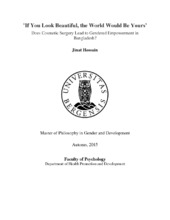"If you look beautiful, the world would be yours" Does cosmetic surgery lead to gendered empowerment in Bangladesh?
Master thesis
Permanent lenke
https://hdl.handle.net/1956/15897Utgivelsesdato
2015-08-14Metadata
Vis full innførselSamlinger
Sammendrag
This study tries to explore the interrelated dynamics among patriarchy, cosmetic surgery and empowerment. While poverty, poor health accessibility and gender inequality are common problems in Bangladesh, a growing number of cosmetic clinics are being established and a number of women are increasingly taking up cosmetic surgeries. This study seeks to explore how and why women take cosmetic surgeries in the context of patriarchy and further to ascertain whether cosmetic surgeries enhance empowerment of women in Bangladesh. This study used in-depth semi structured interviews, a case study method, focus group discussion and observation to collect the data. The produced data was analysed qualitatively to present cases and direct statements from the informants. The data was further analysed by coding informants' responses into themes based on the research objectives and the theories used, namely, the Three Bodies Approach' and Empowerment Theory'. Despite some success stories with respect to cosmetic surgeries, this study shows that there are some women who continue to face socio- economic hardships and challenges from the beginning to the end during the process of treatment. Economic instability, sexual objectification, male superiority, uncertainty, family break up, dependency on husband or medical surgeons are the downbeat results coming from several female patients. The study further indicates that women consumers must possess some form of courage to enable them to go for cosmetic surgeries. The study further shows that even if the women choose surgery, it does not necessarily enhance their empowerment. That is the surgery does bring changes in physical appearance and might make them attractive but it contributes little socially in terms of enabling them to make own decision in the contest of family and in community, rather these women act as prescribed by patriarchal norms and gendered rules, unconsciously and sometimes deliberately. Critical analysis from related theories and contextual backgrounds might provide with a new perspective over this newly growing practice; that this industry, as a matter of fact is regenerating patriarchal norms in society and reproducing the westernized ideal body and beauty structure, but contributes little socially in terms of empowerment. The study concludes with some questions and queries that need more research to be answered.
